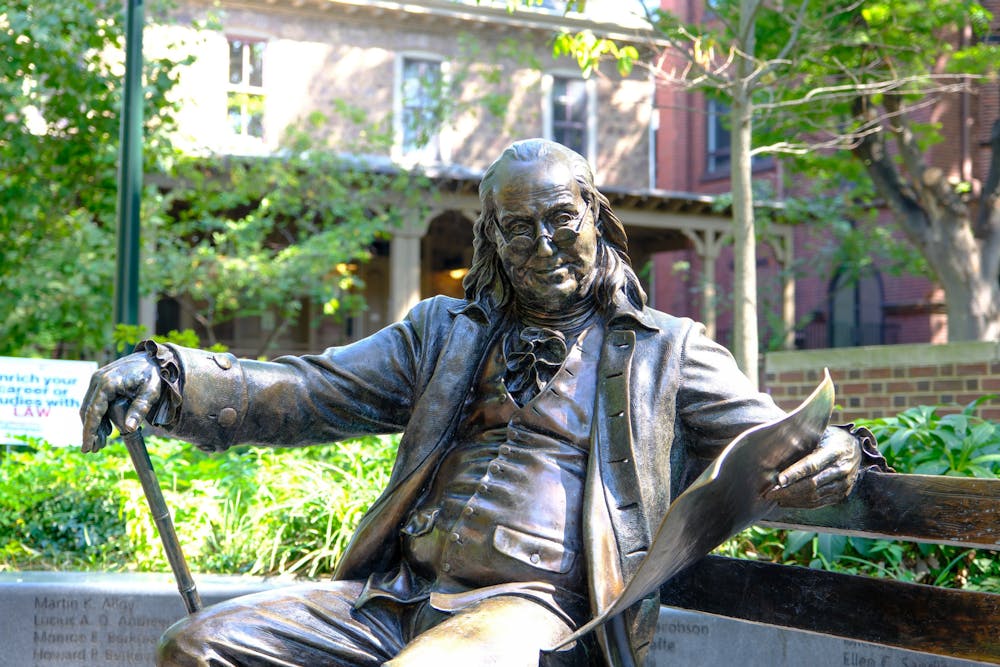
Penn Global will host a lunch reception on Friday at Perry World House to celebrate the 300th anniversary of the arrival of Benjamin Franklin in Philadelphia.
All members of the Penn community are invited to attend the celebration from 12 p.m. to 2 p.m., which will include lunch and remarks from Provost John L. Jackson Jr., Roy F. and Jeannette P. Nichols Chair of American History Emma Hart, and Vice Provost for Global Initiatives Ezekiel Emanuel. Michael Barsanti, the Director of the Library Company of Philadelphia, who received a Ph.D. in English at Penn in 2002, will also speak at the event.
Those attending the event will also be able to enter into a raffle to win a private dinner with Emanuel and four guests of their choosing at the Valley Green Inn, a tavern that exemplifies the style of restaurants that Franklin himself would spend time in.
Emanuel organized the event because he felt that Penn should be doing something for such a monumental moment in American history, specifically the history of Philadelphia and the creation of the city that it is today.
“I like to say Ben Franklin is the most brilliant person ever born in North America … I would say that a few people in history are richer to study than Ben Franklin,” Emanuel said. “He's one of those rare dead white males who still has a lot to teach you, no matter who you are.”
While Penn students hear about Franklin, Emanuel says most students do not know him or the lessons that can be learned from his life.
Hart will discuss the historical context surrounding Franklin’s arrival and the significance of the decade for the colonies.
“[The 1720s was an] era in which people in the colonies were building wealth and a much richer, sophisticated, and cosmopolitan society. So Franklin got to Philly at exactly the right minute to be instrumental in that,” Hart said. “He was the right man in the right place at the right time.”
Franklin left Boston as a 17-year-old to continue his work as a printer. Barsanti said that not everyone saw the city the way Franklin did, especially those already there.
“One of the things [Franklin says is in auto-biography] is that a lot of people in Philadelphia warned him against starting a business and settling down here. They said it was a ‘sinking city,’ a city whose best days were behind it, even in 1723,” Barsanti said.
Emanuel explained Franklin’s curiosity allowed him to forego this advice and help mold Philadelphia, as well as the union as a whole, into what it is today. It was this determination and willingness to take risks that enabled Franklin to become “world-class” in virtually every aspect of his life, Emanuel said.
These defining characteristics of Franklin are also what Emanuel, Hart, and Barsanti hope to emphasize for the Penn community, especially students who appear to veer toward pre-professionalism.
Just as first-year Penn students arrive in Philadelphia around the same time in their lives as Franklin, Barsanti hopes to draw on these parallels to inspire them to remain open-minded about the future and see where their curiosity takes them.
“What I'm looking forward to celebrating is celebrating this kind of moment of renewal and this opportunity for us,” Barsanti said. “To take a page from Franklin's book and say, ‘How can we look at the city new? How can we look at this with the eyes of a 17-year-old who's never been here before?’”
The Daily Pennsylvanian is an independent, student-run newspaper. Please consider making a donation to support the coverage that shapes the University. Your generosity ensures a future of strong journalism at Penn.
Donate







